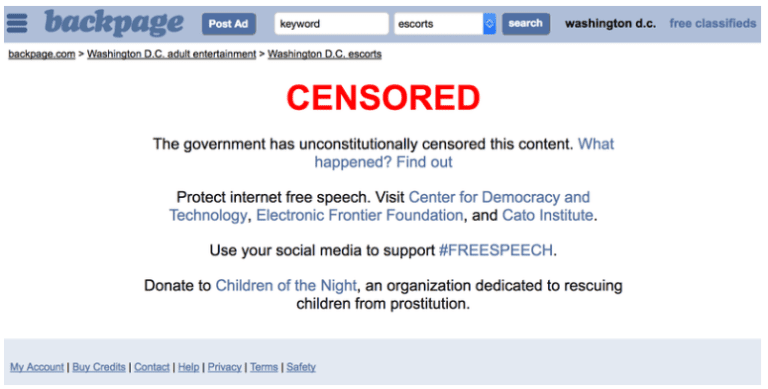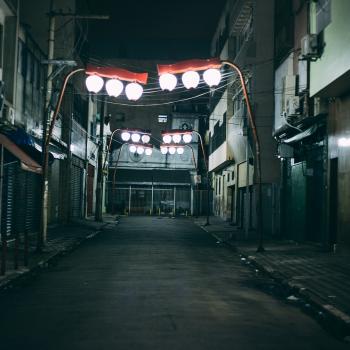January is Human Trafficking awareness month, and in a not-so stunning turn of events the federal government– bolstered by the efforts of anti-trafficking activists– just ensured that a lot of people are about to be in danger.
In fact, these social justice advocates– well meaning, but many of whom don’t actually understand the dynamics of exploitation or even the systemic issues that increase human trafficking– just contributed to making trafficking a bigger problem than it already is. Beyond making trafficking a bigger problem, countless people (women, men, LGBTQ, including LGBTQ youth engaging in survival sex) were just put in danger, and food for untold scores of children was just taken off the table.
All by the people who supposedly “care” the most.
What I’m talking about is the long-waged war on the website backpage.com. From arresting the CEO for “pimping” charges that didn’t stick, they’ve now used well-meaning social influence and the strong arm of government to bully backpage into compliance with their demand: shut down the section of the website where people advertise for erotic services.
Backpage.com has now complied, and has now shut that section down. In what is being seen as a major victory for the exploited, is actually a major blow of defeat. It’s a cause for mourning, an invitation to mobilize in support of those in situations prone for exploitation, and it’s a moment to rebuke an entire movement for harming the very people they say they want to help.
Let me explain the harm caused by bullying Backpage into submission:
The vast majority of people working in the sex industry are doing so either out of choice or circumstance (the two most recent studies I’ve seen, one of which was presented at the International Human Trafficking Conference at the University of Toledo this past fall, where I gave a lecture on trafficking aftercare, puts the combined percentage of choice plus circumstance at or around 90-93% depending on the study, location, and other factors). Furthermore, the majority of those who were women in that category, are also working mothers, so we have more people to consider when we talk of “helping” than just what we see on the surface.
The third category is people who are being trafficked (forced), and everyone wants to help them. In fact, I know no one more committed to helping trafficking victims than those who are in the sex industry themselves.
Of those in the industry by choice or circumstance, places like backpage.com are a friend, not an enemy. It allows them to work in a safe location instead of on the streets. It allows them to filter out clients who are bad news. It allows them to do their job with a certain degree of safety. At the very least, it provides them the opportunity to make work-related decisions with more information.
What did the government and anti-trafficking advocates achieve by shutting it down?
Well, now instead of working from a position of increased safety, a position that allowed them to take necessary and good steps towards harm reduction, these individuals will now have to work from positions of decreased safety and increased harm. To make up lost wages, they’ll be forced to take on more clients, they’ll have less financial freedom to turn down clients they don’t want to meet with, and will likely have to reduce their fees. None of these outcomes are good.
Or maybe their client base just dries up, and now all you’ve done is ensure they can’t pay rent or feed their kids. Yea! What a victory! </sarcasm>
Oh, and not to mention the fact that now they’ll be in closer proximity to law enforcement– people they fear, not just because they’ll be criminalized, but because law enforcement is known to be one of the chief exploiters of street-based sex workers and trafficking victims. It’s a dirty little secret the anti-trafficking industry won’t talk openly about because so much funding hinges upon working with law enforcement, so people don’t dare to speak up outside of closed doors. But I think the reality was best summarized by a trafficking survivor who participated in my 4-year-long doctoral study on trafficking, when she said, “Every survivor I have ever known was more afraid of law enforcement than her own pimp.”
So, here’s the result, brought to you by the anti-trafficking industry themselves:
Countless people across the country who yesterday could pay rent and put food on the table with the help of a harm reduction tool (backpage.com), now have to choose between paying rent and feeding kids, or conducting business in environments where they are at far higher risk of abuse, violence, criminalization by law enforcement, being sexually assaulted or coerced by law enforcement, and— wait for it– at higher risk of becoming a trafficking victim!
The smaller percentage of individuals who are being forced into it? You know, the current trafficking victims everyone wants to help? (And that includes the majority of those who buy sex, by the way.) Well, this accomplished nothing for them, other than it will force their traffickers to push them deeper into the hidden shadows of society where it is now LESS LIKELY we will identify them, or be able to help them.
So, yeah. More people will be prone to becoming trafficking victims, and it will now be harder to find them. Sounds like an amazing victory for the exploited.
I like the way sex-worker/anti-trafficking advocate, Kate D’Adamo put it today:
“No one impacted by this is celebrating. No one. Not sex workers, not people in exploitative conditions, not law enforcement. No one who is affected is celebrating. If you see someone cheering this, you are looking at someone celebrating the vulnerability, violence and abuse of a community they are not a part of and probably to whom they offer nothing.”
So, congratulations, anti-trafficking industry. You just put the people you claim to “care” about in more danger.
Why? How? Well, it ultimately boils down to the fact that you say you want to “help” but you refuse to listen to the voices of sex workers, so that would make a nice start if you’re open to helping instead of causing more harm.
 Dr. Benjamin L. Corey is a public theologian and cultural anthropologist who is a two-time graduate of Gordon-Conwell Theological Seminary with graduate degrees in the fields of Theology and International Culture, and holds a doctorate in Intercultural Studies from Fuller Theological Seminary. He is also the author of the new book, Unafraid: Moving Beyond Fear-Based Faith, which is available wherever good books are sold. www.Unafraid-book.com.
Dr. Benjamin L. Corey is a public theologian and cultural anthropologist who is a two-time graduate of Gordon-Conwell Theological Seminary with graduate degrees in the fields of Theology and International Culture, and holds a doctorate in Intercultural Studies from Fuller Theological Seminary. He is also the author of the new book, Unafraid: Moving Beyond Fear-Based Faith, which is available wherever good books are sold. www.Unafraid-book.com.

















